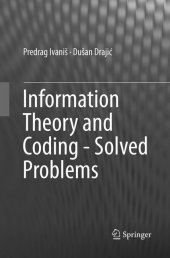 Neuerscheinungen 2018Stand: 2020-02-01 |
Schnellsuche
ISBN/Stichwort/Autor
|
Herderstraße 10
10625 Berlin
Tel.: 030 315 714 16
Fax 030 315 714 14
info@buchspektrum.de |

Dusan Drajic, Predrag Ivanis
(Beteiligte)
Information Theory and Coding - Solved Problems
Softcover reprint of the original 1st ed. 2017. 2018. viii, 517 S. 252 SW-Abb., 95 Tabellen. 235 mm
Verlag/Jahr: SPRINGER, BERLIN; SPRINGER INTERNATIONAL PUBLISHING 2018
ISBN: 3-319-84147-5 (3319841475)
Neue ISBN: 978-3-319-84147-2 (9783319841472)
Preis und Lieferzeit: Bitte klicken
This book is offers a comprehensive overview of information theory and error control coding, using a different approach then in existed literature. The chapters are organized according to the Shannon system model, where one block affects the others. A relatively brief theoretical introduction is provided at the beginning of every chapter, including a few additional examples and explanations, but without any proofs. And a short overview of some aspects of abstract algebra is given at the end of the corresponding chapters. The characteristic complex examples with a lot of illustrations and tables are chosen to provide detailed insights into the nature of the problem. Some limiting cases are presented to illustrate the connections with the theoretical bounds. The numerical values are carefully selected to provide in-depth explanations of the described algorithms. Although the examples in the different chapters can be considered separately, they are mutually connected and the conclusions for one considered problem relate to the others in the book.
Introduction.- Information Sources.- Data Compression.- Information Channels.- Block Codes.- Cyclic Codes.- Convolutional Codes and Viterbi Algorithm.- Trellis Decoding of Linear Block Codes, Turbo Codes.- Low Density Parity Check Codes.
This book is offers a comprehensive overview of information theory and error control coding, using a different approach then in existed literature. The chapters are organized according to the Shannon system model, where one block affects the others. A relatively brief theoretical introduction is provided at the beginning of every chapter, including a few additional examples and explanations, but without any proofs. And a short overview of some aspects of abstract algebra is given at the end of the corresponding chapters. The characteristic complex examples with a lot of illustrations and tables are chosen to provide detailed insights into the nature of the problem. Some limiting cases are presented to illustrate the connections with the theoretical bounds. The numerical values are carefully selected to provide in-depth explanations of the described algorithms. Although the examples in the different chapters can be considered separately, they are mutually connected and the conclusions for one considered problem relate to the others in the book.


